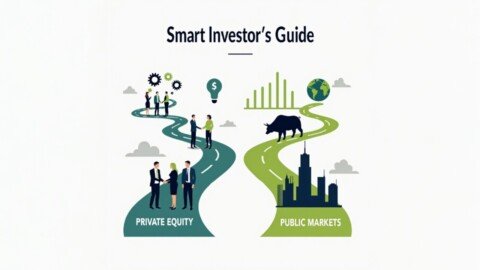Imagine this: You sell your investments, convinced a market crash is coming. Then, stocks soar 20% while you sit on the sidelines. Or worse—you buy at what seems like a low point, only to watch prices drop further.
This is the frustrating reality of market timing. Even professionals struggle to predict short-term movements. Yet, many investors keep trying, often costing themselves thousands in missed gains.
The truth? There’s a better, less stressful way to grow your money—one backed by decades of data. Let’s break it down.
The Myth of Perfect Market Timing
Why Even Experts Get It Wrong
Hedge funds, analysts, and financial gurus have access to cutting-edge tools and data—yet studies show most fail to consistently time the market.
Dalbar Research found the average investor underperforms the S&P 500 by 4% annually due to poor timing decisions.
Nobel Prize-winning research proves markets are efficient—meaning prices reflect all available information instantly.
The Two Big Risks of Trying to Time the Market
Missing the Best Days – Just a few key days account for most market gains. Being out of the market during those spikes destroys returns.
Emotional Whiplash – Fear and greed lead to buying high and selling low, the opposite of smart investing.
What Really Drives Long-Term Investment Success?
Time in the Market > Timing the Market
Warren Buffett’s famous rule holds true: “Our favorite holding period is forever.”
A 1 million today**—if left alone.
Trying to time dips and rallies? Most end up with half those returns.
The Power of Compounding
Reinvested dividends account for 40%+ of total stock market returns.
Dollar-cost averaging (regular, fixed investments) smooths out volatility automatically.
The Smarter Alternative: Strategic Asset Allocation
What Is Asset Allocation?
Instead of guessing market movements, you:
Diversify across stocks, bonds, and other assets
Adjust based on your goals and risk tolerance (not market predictions)
Why It Works
Reduces risk – A market crash in one sector won’t wipe you out.
Removes emotion – You follow a plan, not headlines.
Performs consistently – Outperforms market timing in 90% of 10-year periods (Vanguard study).
How to Implement It
Define Your Risk Profile (Aggressive? Conservative?).
Choose a Simple Mix (e.g., 60% stocks, 30% bonds, 10% alternatives).
Rebalance Periodically (Sell high, buy low—automatically).
Behavioral Finance: Why We Keep Trying (and Failing) to Time Markets
The Psychology Behind Bad Timing Decisions
Recency Bias – “The market’s been falling—it must keep dropping!”
FOMO (Fear of Missing Out) – Jumping into rallies too late.
Overconfidence – “This time, I’ll get it right.”
How to Stay Disciplined
Write an Investment Plan – Rules prevent emotional detours.
Turn Off Financial Noise – CNBC won’t make you richer.
Focus on Controlables – Savings rate, fees, and diversification.
Real-World Case Studies: Timing Fails vs. Steady Wins
The 2008 Financial Crisis Mistake
Panic Sellers – Dumped stocks at lows, missing the +300% rebound.
Steady Investors – Recovered losses by 2012 and tripled money by 2020.
The COVID Crash Example
Market Timers – Waited for “the bottom,” missed the fastest recovery ever.
Long-Term Holders – Saw portfolios hit new highs within months.
How to Invest Without the Guesswork
Step 1: Automate Your Contributions
Set up recurring transfers to your investment account.
Treat it like a bill you can’t skip.
Step 2: Use Index Funds (Forget Stock Picking)
Low-cost S&P 500 ETFs (e.g., VOO, SPY) outperform 80% of active managers.
Bonds? Aggregate bond funds (BND) simplify fixed income.
Step 3: Schedule Quarterly Check-Ins
Rebalance if allocations drift (e.g., stocks surge, making your portfolio riskier).
Ignore short-term noise – Stick to the plan.
FAQs
What if I’m retiring soon? Shouldn’t I avoid market downturns?
Shift to a more conservative allocation (e.g., 40% stocks) in advance—don’t try to predict the perfect exit.
Isn’t technical analysis useful for timing?
For day traders, maybe. For long-term wealth? No evidence it works reliably.
How do I handle a market crash?
Do nothing. Crashes are normal; selling turns paper losses into real ones.
What about buying the dip?
“Dip buying” is still timing. Regular investing (dollar-cost averaging) is safer.
Can algorithms time markets better than humans?
Even AI fails at this. BlackRock’s algorithms underperform simple index funds.
Final Thought: The Freedom of Letting Go
Market timing is a stressful, losing game. The alternative?
Sleep better knowing your plan doesn’t hinge on predictions.
Grow wealth steadily through compounding.
Spend time on things that matter—not stock charts.
Your move: Open your portfolio. Delete the trading app. Set up automatic investments. Then go live your life—your future self will thank you.
Want to Dive Deeper?
The market’s greatest secret? Time beats timing. Always.






